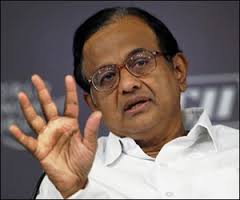New Delhi, Mar 31: Finance Minister P Chidambaram today attacked BJP's PM candidate Narendra Modi saying there are "deep flaws" in his character and warned people against the "danger" from one individual taking over the party, cabinet and government.

"I, me, mine (of Modi). People have enough time to reflect," the senior congress leader told reporters at the AICC headquarters here.
Chidambaram's attack came close on the heels of Modi targeting Sonia Gandhi at an election rally in Assam and demanding that she come clean on who helped the two Italian marines get "safe passage" from the country after killing two fishermen off the Kerala coast.
"Sonia Gandhi should answer the people on who helped the two Italian marines get safe passage from India after killing two fishermen in Kerala," he said.
Hitting out at Modi, Chidambaram said, "There are deep flaws in his character. He cannot resist from making such provocative and derogatory remarks."
The Finance Minister said that Modi had made "such perverse characterisation" of a former Chief Election Commissioner by calling him as 'James Michael Lyngdoh' in election meetings apparently referring to his religion.
"Referring to people practising a certain faith, he had said 'ham panch, hamare pachis. (we five, our 25)'. When he referred to the Congress President sometime back, he said 'das numberi'," Chidambaram said.
He said he was "astonished" by the fact that the party to which he belonged does not point out these "deep character flaws" in Modi. "These are the traits in his character about which we have been talking for the last two years."
Turning to the Italian marines issue, Chidambaram wondered what the country of the Congress President's origin had to do with it as it was a matter before the Supreme Court and the issue was between the lawyers and the courts.
Chidambaram also attacked Modi for his remarks that he would go after the former Maharashtra Chief Minister Ashok Chavan, fielded by Congress from Nanded, in the Adarsh Housing scam.
"Is he going to appoint himself as a Director of CBI. Modi has said that he will go after Chavan, that is an astonishing statement. But if he is appointing himself as CBI Director, then he will have to go against several others in his own party from the south of the Vindhyas and east of the Vindhyas. There are several people," he said.
He was asked about Modi's statement against Chavan while ignoring the CBI charge sheet against a BJP MP from Maharashtra, Ajay Sancheti, who has been accused of having eight benami flats in the Adarsh society.
Responding to questions on the SIT 'clean chit' to Modi in post-Godhara riots, Chidambaram said the SIT had limited mandate and did not have all the powers that the police have.
"SIT gave a report, which has been accepted by the first court. That report has been challenged in higher court. The final word is not yet out. It is wrong to describe the SIT report to the first court as a clean chit," he said.
On Uma Bharati reportedly raking up the Ram temple issue, he said she has spoken her mind. "She is candid and truthful. Many of the BJP leaders are not as truthful as Uma Bharati."
"Deep down, there are many BJP leaders who believe that the temple must be built at the site where the masjid was demolished, uniform civil code should be brought and Article 370 giving special status to Jammu and Kashmir should be done away with," he said.
To a question about the Prime Ministerial capability of Rahul Gandhi, he said that the Congress Vice President will be an "earnest, hardworking, concerned and compassionate" PM and while he has his own ideas, there will be many in the party and the government to give him suggestions.
With the UPA-II's image tarnished by several scams and controversies, the senior Minister admitted that the government and the party could have communicated better on issues like 2G spectrum and coal blocks allocation.
Replying to questions, he also said that he wanted that India should have supported the United Nations Human Rights Resolution against Sri Lanka even though the Ministry of External Affairs chose otherwise.
"I feel we should have voted for the resolution. After all 23 countries voted for it. At least, we would have had the satisfaction of voting for a resolution that called for action against human rights violation in Sri Lanka.





Comments
Add new comment